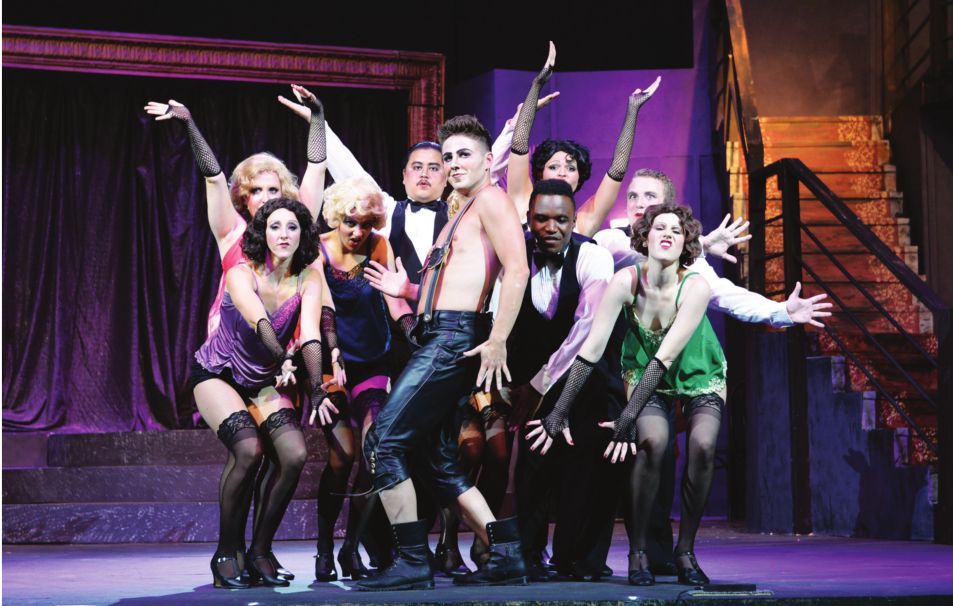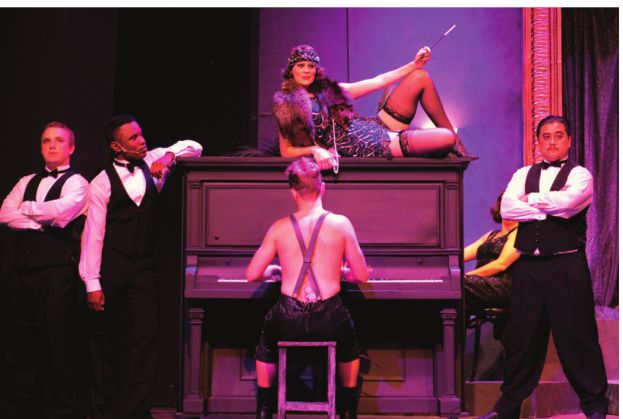
The dark, highly-sexualized Cabaret is an interesting choice for the Muni, that stalwart of wholesome outdoor musical theater where the audience is invited to sing the national anthem before every performance. They went out on a limb, and their ambition is admirable. It just doesn’t seem that everyone is willing to leave the tree house.
I watched Cabaret at Springfield’s Muni Opera on opening night this past Friday. The production is anchored by talented, hard-working leads Aasne Vigesaa and Andrew Mayernich. Vigesaa lights up the stage as Sally Bowles, the English nightclub performer who delights in the intentional oblivion of 1930s Berlin. Mayernich plays the mischievous emcee who serves as a winking narrator of sorts.
Cabaret tells the story of Cliff Bradshaw, a young aspiring American novelist who comes to Berlin looking for a quiet place to write. This quest proves elusive, as the excitable and magnetic Sally Bowles, nightclub chanteuse extraordinaire makes his acquaintance and almost immediately decides to move in with him. She introduces Cliff to Berlin’s nightlife and his writing falls by the wayside. Fraulein Schneider runs the boarding house where Cliff and Sally stay, along with the cheerfully promiscuous Fraulein Kost (played by the delightful Meredith Durall) and Herr Schultz, a kindly Jewish fruit seller who courts the old maid Fraulein Schneider. Their romance seems a chance at bliss for the senior couple, but trouble arises when Nazis arrive on the scene. Meanwhile, Cliff tries to separate himself from the Nazis and is beaten up. He sees the incoming storm on the horizon and tries to whisk Sally away to America. But it is too much of a stretch for the adventurous Sally, who will wait out the storm as Berlin grows darker.
Cabaret, unlike “West Side Story” or “Shrek”, cannot get by on great music sung well and attractive costumes (though the costumes, by Debi Iams are gorgeous. Sally sometimes resembles Lady Mary from “Downton Abbey”, if less refined.) Some of the songs (e.g.“Maybe Next Time”) are inherently full of pathos but the heft of the show relies on the place and time. It is about the atmosphere: lasciviousness, glamour, art and excess with a light dusting of foreboding. The above were hinted at, but the chorus, dancers and peripheral characters seemed to be more focused on dance steps and remembering lines than actually living in a world of Nazis and terrifying shifts in power. With stronger direction, the show could have benefited from a quicker pace and staging that was more than utilitarian. Several actors seem to be sleepily pontificating rather than offering up their vulnerabilities and asking for salvation. Cabaret needs high stakes, which are often missing here.
Luckily, Vigesaa and Mayernich do an admirable job of carrying the show. Mayernich, the Emcee of the Kit Kat Club as well as the show itself, reels the audience in (“Wilkommen, bienvenue, welcome…”) with sly mirth, and we know we are in good hands. It is distracting that not everyone in the Cabaret seems of his wild world, but it is forgivable because Mayernich is a skillful dancer and a strong actor. His work in the final scenes of the musical was particularly arresting. He successfully embodied the contrast between pre-war and wartime Berlin: after gyrating and cracking raunchy jokes in the first act, the second act brings him to his knees.
Vigesaa
is a powerhouse in a powerhouse role. Her evocative voice and athletic
dancing were nearly beside the point. Her portrayal of Sally is
magnetic. In Vigesaa’s hands, Sally’s naiveté is complex and her need to
be adored central. She never stops moving but every move is deliberate,
honest and raw.
The
nationalism that led to the Nazi takeover of Germany resonates in
certain political movements today. As Nazi supporters discussed who was a
real German and who wasn’t, I was reminded of a presidential candidate
and politicians who want to close the borders of the United States. The
movement (both now and then) is insidious and pernicious.
“Tentative”
is the word that kept coming to mind in the Kit Kat Club’s ensemble
numbers. The performers ought to come across as Cabaret veterans,
comfortable with their bodies and choreography, maybe even a little
blasé. Uncomfortable, ardently smiling young dancers do not tell the
same story. Tentative could also describe the use of German accents by
those who played Germans. Each seemed to have picked a few key sounds to
replace and left the rest alone, having the effect of very confusing
dialogue.
I do not
argue that a community production ought to be held to professional
theatrical standards. But as far as storytelling, we need to agree on
what the story is and get the whole company comfortable telling the
tale. Rich McCoy’s director’s note is telling: “Cabaret seems an
unlikely choice to be a popular musical…we know that there will be no
happy ending.” Indeed it is treated here a bit like a simple song and
dance show except with Nazis. If a company is going to make an unlikely
choice, it should make it knowing why and should commit wholeheartedly,
especially with a story as important as this one.
Contact Ann Farrar at [email protected].
